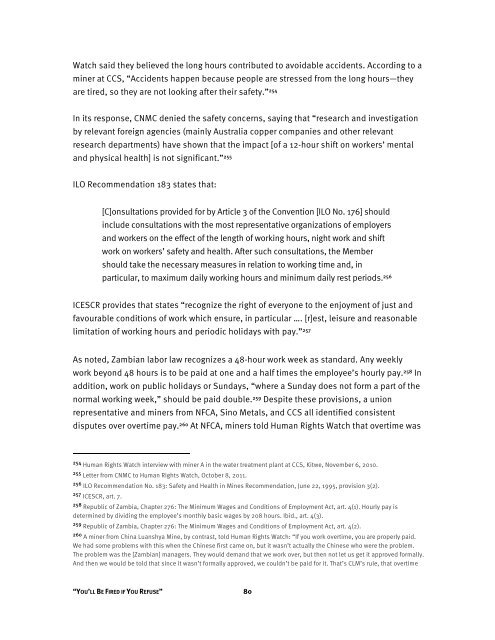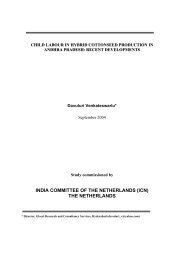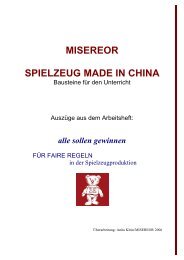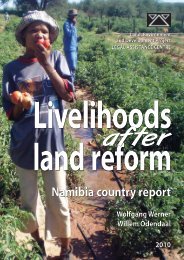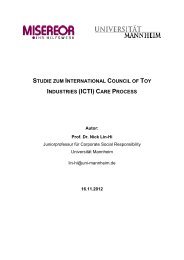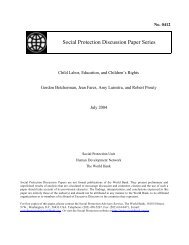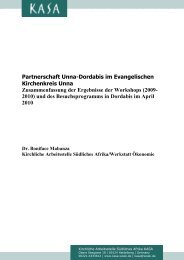“You'll Be Fired if You Refuse†- Human Rights Watch
“You'll Be Fired if You Refuse†- Human Rights Watch
“You'll Be Fired if You Refuse†- Human Rights Watch
You also want an ePaper? Increase the reach of your titles
YUMPU automatically turns print PDFs into web optimized ePapers that Google loves.
<strong>Watch</strong> said they believed the long hours contributed to avoidable accidents. According to a<br />
miner at CCS, “Accidents happen because people are stressed from the long hours—they<br />
are tired, so they are not looking after their safety.” 254<br />
In its response, CNMC denied the safety concerns, saying that “research and investigation<br />
by relevant foreign agencies (mainly Australia copper companies and other relevant<br />
research departments) have shown that the impact [of a 12-hour sh<strong>if</strong>t on workers’ mental<br />
and physical health] is not sign<strong>if</strong>icant.” 255<br />
ILO Recommendation 183 states that:<br />
[C]onsultations provided for by Article 3 of the Convention [ILO No. 176] should<br />
include consultations with the most representative organizations of employers<br />
and workers on the effect of the length of working hours, night work and sh<strong>if</strong>t<br />
work on workers’ safety and health. After such consultations, the Member<br />
should take the necessary measures in relation to working time and, in<br />
particular, to maximum daily working hours and minimum daily rest periods. 256<br />
ICESCR provides that states “recognize the right of everyone to the enjoyment of just and<br />
favourable conditions of work which ensure, in particular …. [r]est, leisure and reasonable<br />
limitation of working hours and periodic holidays with pay.” 257<br />
As noted, Zambian labor law recognizes a 48-hour work week as standard. Any weekly<br />
work beyond 48 hours is to be paid at one and a half times the employee’s hourly pay. 258 In<br />
addition, work on public holidays or Sundays, “where a Sunday does not form a part of the<br />
normal working week,” should be paid double. 259 Despite these provisions, a union<br />
representative and miners from NFCA, Sino Metals, and CCS all ident<strong>if</strong>ied consistent<br />
disputes over overtime pay. 260 At NFCA, miners told <strong>Human</strong> <strong>Rights</strong> <strong>Watch</strong> that overtime was<br />
254 <strong>Human</strong> <strong>Rights</strong> <strong>Watch</strong> interview with miner A in the water treatment plant at CCS, Kitwe, November 6, 2010.<br />
255 Letter from CNMC to <strong>Human</strong> <strong>Rights</strong> <strong>Watch</strong>, October 8, 2011.<br />
256 ILO Recommendation No. 183: Safety and Health in Mines Recommendation, June 22, 1995, provision 3(2).<br />
257 ICESCR, art. 7.<br />
258 Republic of Zambia, Chapter 276: The Minimum Wages and Conditions of Employment Act, art. 4(1). Hourly pay is<br />
determined by dividing the employee’s monthly basic wages by 208 hours. Ibid., art. 4(3).<br />
259 Republic of Zambia, Chapter 276: The Minimum Wages and Conditions of Employment Act, art. 4(2).<br />
260 A miner from China Luanshya Mine, by contrast, told <strong>Human</strong> <strong>Rights</strong> <strong>Watch</strong>: “If you work overtime, you are properly paid.<br />
We had some problems with this when the Chinese first came on, but it wasn’t actually the Chinese who were the problem.<br />
The problem was the [Zambian] managers. They would demand that we work over, but then not let us get it approved formally.<br />
And then we would be told that since it wasn’t formally approved, we couldn’t be paid for it. That’s CLM’s rule, that overtime<br />
“YOU’LL BE FIRED IF YOU REFUSE” 80


